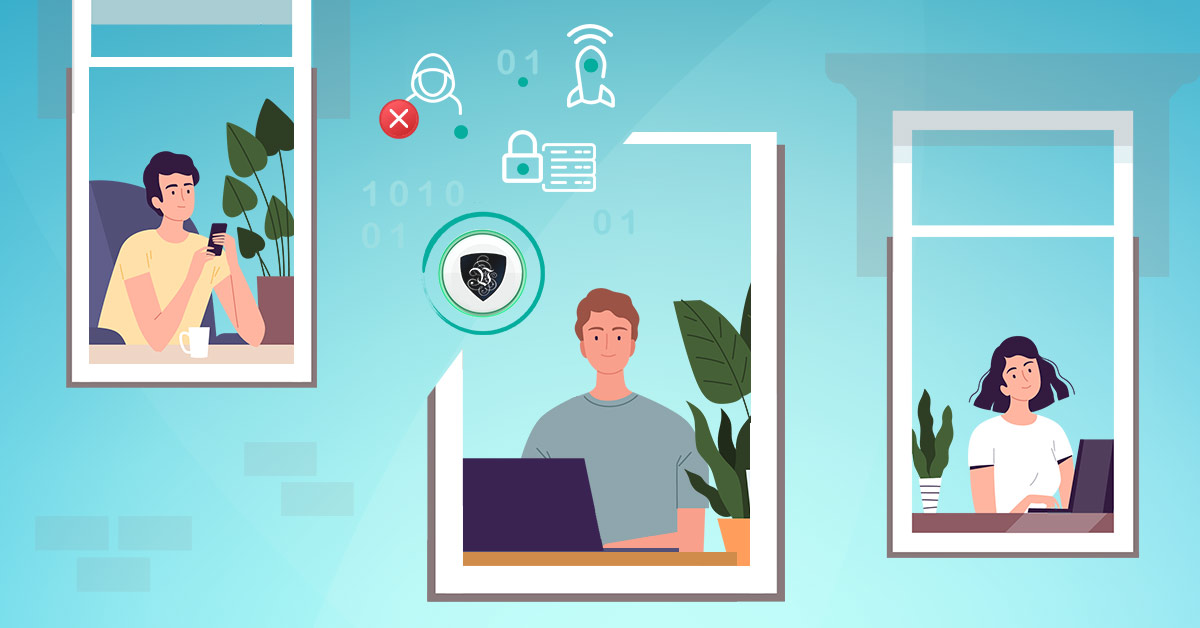To be fair, the Occupational Safety and Health Administration, or OSHA, doesn’t mention VPN for remote work simply because the stress-related medical impacts of having your data stolen are not as direct as some other injuries. But, when your livelihood is on the line, there is bound to be stress.
For companies, clients, and employees alike, moving the work to a home office is a dangerous task because you can’t see what everyone is doing. This lack of trust is bad for business in general and can slow down every single process.
To solve this easily, every company should employ a collective VPN connection.
There are three significant benefits for such a connection:
- Faster connection and less needed clearance
- Security from outside spying
- Encrypted middle server
The company would be renting a ”middleman” server that will secure each employee individually. And, unlike regular connections, there is no chance that such a server will be hacked.
Additionally, if you are using a premium VPN provider such as Le VPN, there are other benefits and even a possibility to install the VPN app on mobile devices for essential workers in the field.
Why Do We Need VPN for Remote Work?
While we should use a VPN at home in general, the stakes are significantly raised when you are also working from your home computer. Now, you are not only responsible for your data, but the data of the company and the clients.
There is also a legal issue. When you are at work, liability for cybersecurity falls on the company. But, if something is leaked from your home computer, you will not only lose your job and reputation but also risk a criminal lawsuit.
Generally, it is hard to prove if you have sent something on purpose, due to negligence, or if you were hacked.
Safety for the Company
A functional company, especially one that works with online clients, should invest in its cybersecurity. Ideally, there should be a dedicated server inside the company itself that would have all of the protections needed.
Regretfully, when having people working remotely, this is not possible. Even if they are connecting to the company server, there are several local ISP servers in-between that can get compromised.
The regular solution for this is to have multiple layers of credentials for every employee. This reduces productivity and makes everything work slower.
If the system has a glitch, you would need hours, if not days, to solve it. Using a VPN and connecting through cloud services is not only safer but also more productive.
Mixing Business and Pleasure
If you have employees working remotely, they will use the same computer for personal and professional needs. This is unavoidable, even if they have a dedicated laptop or tablet.
If there isn’t a secure VPN server in the mix, this can compromise the company’s security. Mainly social media will use cookies and other tracking software. And, unlike in the office, you can’t block these pages or route them through a secure server without a VPN.
Safety for the Clients
Essential cybersecurity is only half of the issue when it comes to your clients. The perception of said security is vital as well.
Because you have people working online from home, you won’t be able to supervise and minimize the leaks. People working will often have their system for storing files, and anyone short of an experienced freelancer won’t have that system developed for cybersecurity.
Reputation is Everything
You need years to establish the reputation of your company, and it can be tarnished in minutes. A single hack and data leak would not only put you under legal liability but will most probably ruin your future opportunities.
This is why every company, regardless of whether they are a single person or a vast multinational, needs to do everything to protect their clients’ interests and property.
Safety for the Employee
Finally, there is the employee that does the work. While experienced freelancers already know most of the internet safety tips needed to be safe, people who recently started working remotely usually do not.
And for the uninitiated, this can be a daunting responsibility. There are no supervisors, and no help is coming if you get stuck. Everything you do is totally on you.
For some, this freedom will be refreshing. The level of stress is not for everyone, and some support from the company will be necessary, at least in the beginning.
The Domino Effect
The biggest reason why everyone would need a VPN for remote work is the domino effect. This means that your smartphone can be digitally pickpocketed when in the store. Then it will infect your computer, which will infect others in your network.
Before you blink, the company and client information has been stolen, and your supervisor is getting emails for ransomware.
This is why it is necessary not only to use a VPN on your main computer but also on all of your devices. You never want to be that first domino that made the whole system crash down.
Conclusion
Using a VPN for remote work should form a cornerstone of the new way companies do business. Even after the beer virus has ended, and we can return to the office, many companies will realize that that might not be needed.
And if the employees are working from home, they will need to be safe. This is where VPN providers like Le VPN, as well as anti-virus and anti-spyware software, come in – to ensure workplace safety when your workplace is your home.
EXCLUSIVE DEAL
First 3 years for $2.22/mo
NO LOGS
100+ LOCATIONS
P2P ALLOWED
Easy To Use
30-Day Money Back
Friendly Support
Bitcoin Accepted
Ultra High Speeds



